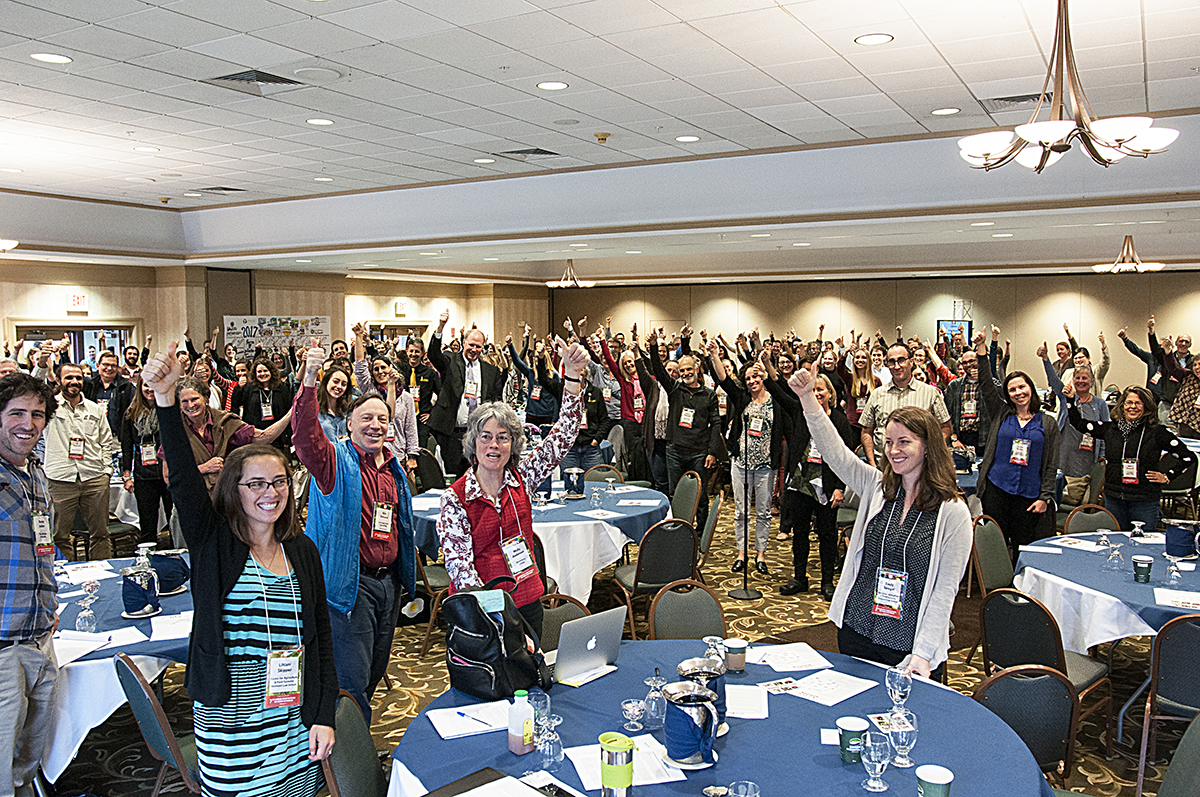Workforce development and business succession necessary for continued growth in Vermont’s food system
November 02, 2017

Over 270 members of the Vermont Farm to Plate Network convened October 26-27, 2017 at the 7th annual Farm to Plate Network Gathering in Killington to address workforce development and business succession challenges in Vermont’s farm and food economy. Comprised of food producers, farmers, food system businesses, nonprofit organizations, educational institutions, capital providers, and government officials, the Farm to Plate Network is responsible for implementing Vermont’s statewide food system plan to increase jobs and economic development in the farm and food economy and improve access to healthy local food for all Vermonters.
Key Takeaways for Vermont
- Perceptions surrounding the types of jobs and careers in the food system need to expand beyond farming and production to include the entire supply chain—manufacturing, distribution, processing, management, retail, marketing, education, finance, environment, and agricultural technologies.
- A larger workforce equipped with the skills required by employers is necessary for Vermont farms and food businesses to grow. Deeper connectivity between employers and employees within the food system in needed, as well as an aligned statewide workforce development system.
- Succession planning is critical for farms and food businesses who want to maintain or grow here in Vermont. Planning for ownership changes and exit strategies takes time and should become integrated into overall business planning (rather than retirement planning).
The Impacts of Local Food Economic Growth
The local food economy is growing and gross local food sales currently account for approximately 7 percent ($189 million) of total food sales (compared to 5 percent in 2010). Food manufacturing is one of the few growing manufacturing sectors in Vermont and the food system employs 64,000 Vermonters.
“The Farm to Plate Network’s efforts to implement Vermont’s food system plan has resulted in greater collaboration in our farm and food economy and has led to strong job growth, economic development, and improved local food access—all goals of the plan,” says Jake Claro, Farm to Plate director at the Vermont Sustainable Jobs Fund. “However, as the farm and food economy grows and more jobs are created, we are seeing workforce challenges for both employees and employers.”
Workforce Development
Many food system businesses report they have trouble finding work-ready employees, and that this lack of labor is stifling their ability to grow. Businesses report that entry level skills such as timeliness, accountability, work ethic, and basic writing and math skills are hard to come by. Additionally, food system jobs are often perceived as being low-wage with low-benefits and offer little room for career advancement, resulting in employers having trouble attracting talent. Contrary to these perceptions, Vermont Department of Labor data indicates that many of these jobs offer competitive wages, alongside a good quality of life, and an opportunity to be part of a growing sector of Vermont’s economy.
At the Farm to Plate Network Gathering, Dan Smith, president of the Vermont Community Foundation, led a panel discussion on how to further address workforce development challenges. Panelists included Representative Tristan Toleno (Brattleboro)/Entera Catering and Rigani Catered Wood-Fired Pizza, Maureen Hebert/Vermont Technical College, Randy George/Red Hen Baking Co., Jed Davis/The Farmhouse Group, and Beth Whiting/Maple Wind Farm.
The Farm to Plate Network will incorporate panelist insights into efforts to develop deeper connectivity between workforce development organizations and food system stakeholders focused on exploring the balance between developing a skilled workforce that meets the needs of employers while also providing workers with career growth opportunities, a positive work environment, and competitive wages and benefits.
The panel will also help inform the Farm to Plate Network’s current efforts to provide a wide range of career profiles for students, guidance counselors, and parents to inform them about the vast spectrum of food system careers. Ultimately this could improve the image and change perceptions so food system careers are seen as viable career paths for Vermont students. Efforts to strengthen partnerships among workforce development, education, and business stakeholders being piloted in Central Vermont, Northern Vermont/Lamoille, and Brattleboro regions will be enhanced by knowledge gained at the Farm to Plate Network Gathering.
Business Succession
With the overall economic growth in Vermont’s food economy over the last decade, more food businesses beyond farms have emerged as significant economic drivers in the state, and with their growth has come questions and concerns about who will own and operate these businesses into the future.
Anson Tebbetts, Secretary of the Vermont Agency of Agriculture, Food & Markets, led a panel discussion to examine different perspectives on why businesses sell, why ownership matters, how owners make decisions between different succession and ownership options, and why it’s never too early to talk about exit strategies. Panelists included Allison Hooper/Former owner of Vermont Creamery, Lisa Lorimer/Former owner of Vermont Bread Company, Charles Storey/Harpoon Brewery, Ryan Christiansen/Caledonia Spirits, Ben Whitcomb/North Williston Cattle Company, and Janice St. Onge/Flexible Capital Fund.
With more than 30 percent of the state’s farmland currently owned or managed by farmers older than 65, and 91 percent of those farmers working without an operator under the age of 45, farmland succession planning has been a topic many food system stakeholders have been working to address over the past two years.
“Business succession is a newer topic and the message at the Farm to Plate Network Gathering was loud and clear: incorporating business succession planning early on in the life cycle of a business is critical for farms and food businesses to maintain or grow operations in Vermont,” says Claro. “The Farm to Plate Network creates the space for strategic conversations across multiple audiences and perspectives to make systematic food system change that no one organization can accomplish alone. We are well-positioned to support collaboration among business assistance service providers and organizations to incorporate exit strategies and succession planning into their work with Vermont food businesses, as well as farms.”
About Farm to Plate
Farm to Plate is Vermont’s food system plan being implemented statewide to increase economic development and jobs in Vermont’s farm and food sector and improve access to healthy local food for all Vermonters. The ten year Farm to Plate Strategic Plan (2011-2020) to create a viable, sustainable, and resilient food system to produce and distribute our food is being implemented by the Farm to Plate Network—over 350 farm and food sector businesses, non-profits, institutions, and government agencies from across the state. Farm to Plate is a program of the Vermont Legislature, administered by the Vermont Sustainable Jobs Fund, a non-profit organization based in Montpelier, Vermont. www.VTFarmtoPlate.com
###




